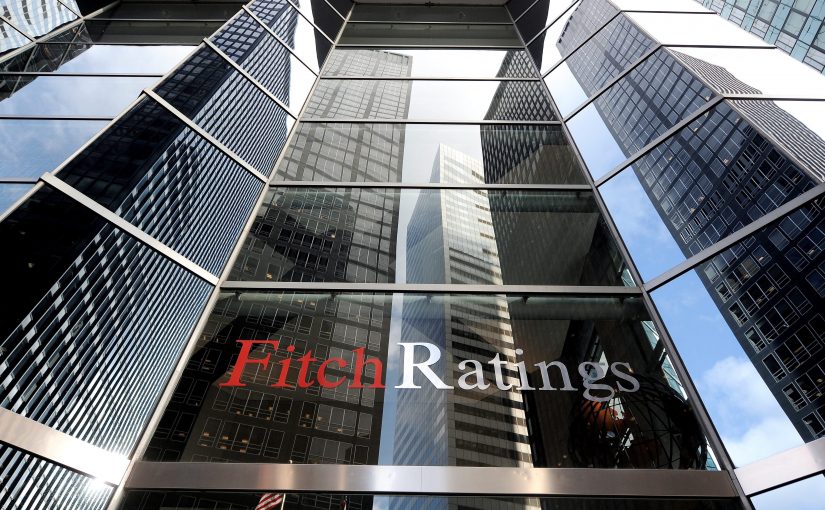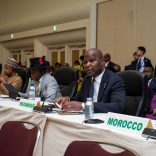EU and France invest €145 million to strengthen Mozambique’s rail infrastructure
Fitch affirms Mozambique at ‘CCC+’

File photo: Lusa
Fitch Ratings has affirmed Mozambique’s Long-Term Foreign-Currency Issuer Default Rating (IDR) at ‘CCC+’. Fitch typically does not assign Outlooks to sovereigns with a rating of ‘CCC+’ or below.
A full list of rating actions is at the end of this rating action commentary.
Key rating drivers
Substantial Credit Risk: Mozambique’s ‘CCC+’ rating reflects elevated government debt levels, wide fiscal deficits, still unresolved public-sector debt liabilities, low GDP per capita, weak governance indicators and a challenging security situation. The agreement of a three-year USD456 million Extended Credit Facility with the IMF in 2022 substantially eased Mozambique’s financing constraints and provides some support to creditworthiness.
Gradual Narrowing of Fiscal Deficit Ahead: Fitch estimates Mozambique’s fiscal deficit remained wide in 2022, at 4.7% of GDP (compared with 4.8% in 2021), reflecting an increase in government expenditure. This was driven by an estimated 2.5pp increase in salary expenses to 16.5% of GDP, due to the introduction of a new public sector wage scale, and significantly above the 0.8pp increase the government initially anticipated. This more than offsets the positive impact on the budget balance of lower capital expenditure (by 0,9pp to 6.3% of GDP) and a 1pp increase in total government revenue to 28.7% of GDP driven by higher grant disbursement.
Fitch expects the fiscal deficit to narrow to 4% of GDP in 2023 and 3.1% of GDP in 2024. This will primarily be driven by a decline in total expenditure to 31.4% of GDP from 33.4%, partly reflecting a 1.2pp decline in salaries as the government reduces the number of employees (replacing only one in three leaving employees). A decline in grant disbursement will be offset by an increase in tax revenue driven by receipts from the nascent LNG production, the elimination of VAT exemptions and higher revenue from personal income tax.
IMF Programme Eases Financing Constraints: Fitch expects Mozambique’s amortisations (domestic and external) to remain broadly stable at 4.4% of GDP in 2023 and 4.2% in 2024, from an estimated 4.2% in 2021. External amortisations will amount to 2.6% of GDP in 2023 and 2.3% in 2024. Mozambique will meet its financing needs through external disbursements from the official sector, including the IMF, the World Bank and the African Development Bank, as well as issuance in the domestic bonds market. Nevertheless, financing risks persist, given declining domestic demand for government bonds at primary auctions.
Gradual Decline of Government Debt: Fitch expects government debt/GDP to decline to 101.5% of GDP in 2024 from an estimated 111.6% at end-2022, mostly driven by nominal GDP growth of 26% over the period. Our debt metrics include arrears, such as the loans to two former state-owned enterprises (SOE; Proindicus and MAM) worth 8.8% of GDP. The government has challenged the validity of both guarantees through legal disputes in the English courts, but there is still a risk that they may crystallise on the sovereign’s balance sheet depending on the outcome of the legal proceedings.
The government’s exposure to currency risk is substantial with the share of FX-denominated debt an estimated 71.0% of the total stock, albeit down from 87.5% in 2016. We expect interest payments to increase to 11.1% of revenue in 2024 (from 10.7% in 2022), partly due to an increase in interest rates (from 5% to 9%) on Mozambique’s sole Eurobond, above the ‘B’/’C’/D’ median of 10.7% Fitch forecasts for that year. The average time-to-maturity of debt remains long, at 10 years in 2022, but down from 13.5 years in 2016. Amortisations on the Eurobond only begin in 2028 (USD225 million per year until 2031).
Growth to Rise on LNG Projects: We estimate real GDP growth increased to 4% in 2022, from 2.3% in 2021, primarily reflecting a strong performance in services amid the easing of pandemic-related restrictions. Economic growth will then increase further, to 4.7% in 2024 and 7.4% in 2024, driven by Mozambique’s nascent LNG sector. ENI’s Coral Sul (Area 4) project began production in 4Q22 and a significant ramp-up in output is expected over the medium term. Fitch also assumes that the construction of Total’s USD20 billion Area 1 LNG project will resume in 2024, with positive spill-overs for the country’s economy. Nevertheless, conditions for non-LNG related activities will remain challenging, given both high inflation and rising domestic financing costs.
Inflation to Ease: We expect inflation to decline in 2023, on the back of easing global Brent prices (transportation costs account for 39% of the CPI basket), but to remain high at an average 7.3% (from 10.3% in 2022). The central bank tightened monetary policy significantly in 2022, with a cumulative 400bp increase in its key policy rate and a sizeable increase in banks’ coefficient of mandatory reserves (from 10.5% to 28%). We do not anticipate an easing in monetary policy before 2024, given signs of still high inflation expectations and risks from rising public sector wages.
International Reserves to Stabilise: Fitch estimates Mozambique’s current account deficit (CAD) to have widened to 33.3% of GDP in 2022, from 22.8% in 2021, mostly reflecting the sizeable one-off impact of the import of Coral Sul’s floating LNG platform. The CAD will then narrow to 11.3% of GDP in 2023, as imports related to megaprojects decline substantially, before widening again to 31.1% as imports linked to Total’s Area 1 project resume. The impact of megaprojects on international reserves and Mozambique’s broader external stability is limited, as these are fully financed by financial account inflows (foreign direct investment and trade credits).
We estimate Mozambique’s international reserves to have declined by USD800 million to USD2.9 billion in 2022, and then forecast an increase to USD3.2 billion in 2023 and USD3.4 billion in 2024. The decline in reserves in 2022 was mostly driven by higher fuel import prices, which led the central bank to sell FX in order to meet demand not served by the interbank market. Lower fuel import costs and the central bank’s decision to significantly increase the banking sector’s mandatory reserves in foreign currency (to 28% from 10.5%) will drive the forecast increase in reserves.
ESG – Governance: Mozambique has an ESG Relevance Score (RS) of ‘5’ for both Political Stability and Rights and for the Rule of Law, Institutional and Regulatory Quality and Control of Corruption. Theses scores reflect the high weight that the World Bank Governance Indicators (WBGI) have in our proprietary Sovereign Rating Model. Mozambique has a low WBGI ranking at 22.3, reflecting the absence of a recent track record of peaceful political transitions, violence associated with the insurgency, relatively weak rights for participation in the political process, weak institutional capacity, uneven application of the rule of law and a high level of corruption.
Rating sensitivities
Factors that could, individually or collectively, lead to negative rating action/downgrade:
-Public Finances: Increased likelihood of a default event or a restructuring of sovereign market instrument, for example through participation in the G20 Common Framework.
-Public Finances: A sustained deterioration in financing options, for example, due to saturation of the domestic government bonds market or reduced capacity to access external financing sources and/or a substantial increase in the public debt/GDP ratio, for instance, as a result of widening fiscal deficits.
-External Finances: A significant decline in international reserves.
Factors that could, individually or collectively, lead to positive rating action/upgrade:
-Public Finances: A substantial decline in the public debt/GDP ratio, for instance, as a result of a sustained reduction in the budget deficit or favourable court decisions for Mozambique’s SOEs’ debt obligations.
-Macro: Greater confidence in medium-term growth prospects, through the timely coming on stream of the LNG megaprojects.
-Structural: A strong improvement in public finance management.
Sovereign Rating Model (SRM) and Quantitative Overlay (QO)
Fitch’s proprietary SRM assigns Mozambique a score equivalent to a rating of ‘CCC+’ on the Long-Term Foreign-Currency IDR scale. However, in accordance with its rating criteria, Fitch’s sovereign rating committee has not utilised the SRM and QO to explain the ratings in this instance. Ratings of ‘CCC+’ and below are instead guided by the rating definitions.
Fitch’s SRM is the agency’s proprietary multiple regression rating model that employs 18 variables based on three-year centred averages, including one year of forecasts, to produce a score equivalent to a LT FC IDR. Fitch’s QO is a forward-looking qualitative framework designed to allow for adjustment to the SRM output to assign the final rating, reflecting factors within our criteria that are not fully quantifiable and/or not fully reflected in the SRM.
Best/Worst case rating scenario
International scale credit ratings of Sovereigns, Public Finance and Infrastructure issuers have a best-case rating upgrade scenario (defined as the 99th percentile of rating transitions, measured in a positive direction) of three notches over a three-year rating horizon; and a worst-case rating downgrade scenario (defined as the 99th percentile of rating transitions, measured in a negative direction) of three notches over three years. The complete span of best- and worst-case scenario credit ratings for all rating categories ranges from ‘AAA’ to ‘D’. Best- and worst-case scenario credit ratings are based on historical performance. For more information about the methodology used to determine sector-specific best- and worst-case scenario credit ratings, visit https://www.fitchratings.com/site/re/10111579.
Sources of Information
The principal sources of information used in the analysis are described in the Applicable Criteria.
References for substantially material source cited as key driver of rating
The principal sources of information used in the analysis are described in the Applicable Criteria.
ESG considerations
Mozambique has an ESG Relevance Score of ‘5’ for Political Stability and Rights as World Bank Governance Indicators have the highest weight in Fitch’s SRM and are therefore highly relevant to the rating and a key rating driver with a high weight. As Mozambique has a percentile rank below 50 for the respective Governance Indicator, this has a negative impact on the credit profile.
Mozambique has an ESG Relevance Score of ‘5’ for Rule of Law, Institutional & Regulatory Quality and Control of Corruption as World Bank Governance Indicators have the highest weight in Fitch’s SRM and are therefore highly relevant to the rating and are a key rating driver with a high weight. As Mozambique has a percentile rank below 50 for the respective Governance Indicators, this has a negative impact on the credit profile.
Mozambique has an ESG Relevance Score of ‘4’for Human Rights and Political Freedoms as the Voice and Accountability pillar of the World Bank Governance Indicators is relevant to the rating and a rating driver. As Mozambique has a percentile rank below 50 for the respective Governance Indicator, this has a negative impact on the credit profile.
Mozambique has an ESG Relevance Score of ‘4’ for Creditor Rights as willingness to service and repay debt is relevant to the rating and is a rating driver for Mozambique, as for all sovereigns. As Mozambique has a fairly recent restructuring of public debt in 2020, this has a negative impact on the credit profile.
Except for the matters discussed above, the highest level of ESG credit relevance, if present, is a score of ‘3’. This means ESG issues are credit-neutral or have only a minimal credit impact on the entity, either due to their nature or to the way in which they are being managed by the entity. For more information on Fitch’s ESG Relevance Scores, visit www.fitchratings.com/esg.












Leave a Reply
Be the First to Comment!
You must be logged in to post a comment.
You must be logged in to post a comment.